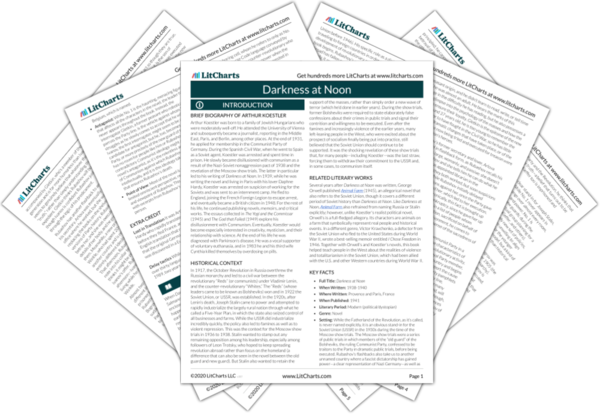The histories of nations can be understood as stories that members of a society tell themselves about where they came from and where they are going. The defining characteristic of the history of a totalitarian state (like the one in Darkness at Noon) is the political necessity of unquestioned adherence to a singular narrative that benefits the Party. In other words, the Party gets to define the only story that citizens are permitted to tell about their society. When citizens stray from this narrative, they become political dissidents, as the Party’s version of history is tantamount to law. It’s not enough for the state, then, to merely to punish or torture dissidents: dissidents must openly and publicly proclaim their wrongs and, by doing so, confirm the only narrative about the Party that is permitted. In that sense, the forcibly extracted confessions of guilt—from Rubashov, Ivanov (though offstage), and others—are ways to reenact the historical arc of the society, smoothing out any wrinkles and conflicts so that a happy ending might be reached.
It’s important to understand that, for the image of the Party, confessions must be enacted in the form of a public performance. Truth in this society is a function of what is best for the Party, rather than fundamental facts to be uncovered. As such, truth cannot simply emerge or exist: it must be told, retold, and performed on the stage of the court. This performance is then reenacted by everyone who reads the official Party account of public trials, including Vera Wassiljovna, who reads it aloud to her father. Darkness at Noon moves between metaphors of a story and metaphors of a stage. Though the stage metaphor is more apparently theatrical (meant to underline the inauthentic, constructed nature of truth in this society), both metaphors imply that confessions are less about revealing guilt than they are about enacting and preserving the very laws, narratives, and fictions by which this society is held together.
Truth, Confession, and Performance ThemeTracker

Truth, Confession, and Performance Quotes in Darkness at Noon
Up till now, he had never imagined Arlova’s death in such detail. It had always been for him an abstract occurrence; it had left him with a feeling of strong uneasiness, but he had never doubted the logical rightness of his behavior. Now, in the nausea which turned his stomach and drove the wet perspiration from his forehead, his past mode of thought seemed lunacy. The whimpering of Bogrov unbalanced the logical equation.
“We whip the groaning masses of the country towards a theoretical future happiness, which only we can see. For the energies of this generation are exhausted; they were spent in the Revolution; for this generation is bled white and there is nothing left of it but a moaning, numbed, apathetic lump of sacrificial flesh….Those are the consequences of our consequentialness.”
“In periods of maturity it is the duty and the function of the opposition to appeal to the masses. In periods of mental immaturity, only demagogues invoke the ‘higher judgment of the people.’ In such situations the opposition has two alternatives: to seize the power by a coup d’état, without being able to count on the support of the masses, or in mute despair to throw themselves out of the swing—‘to die in silence.’ There is a third choice which is no less consistent, and which in our country has been developed into a system: the denial and suppression of one’s own conviction when there is no prospect of materializing it.”
Instead of the old portraits, a light patch shone from Ivanov’s wallpaper; philosophical incendiarism had given place to a period of wholesome sterility. Revolutionary theory had frozen to a dogmatic cult, with a simplified, easily graspable catechism, and with No. 1 as the high priest celebrating the Mass.
Gletkin read straight on, stiffly and with deadly monotony. Did he really believe what he was reading? Was he not aware of the grotesque absurdity of the text?
“If one told the people in my village,” said Gletkin, “that they were still slow and backward in spite of the Revolution and the factories, it would have no effect on them. If one tells them that they are heroes of work, more efficient than the Americans, and that all evil only comes from devils and saboteurs, it has at least some effect. Truth is what is useful to humanity, falsehood what is harmful.”
“The policy of the opposition is wrong. Your task is therefore to make the opposition contemptible; to make the masses understand that opposition is a crime and that the leaders of the opposition are criminals. That is the simple language which the masses understand. If you begin to talk of your complicated motives, you will only create confusion amongst them.”
“Covered with shame, trampled in the dust, about to die, I will describe to you the sad progress of a traitor, that it may serve as a lesson and terrifying example to the millions of our country…”
“…After a short deliberation, the President read the sentence. The Council of the Supreme Revolutionary Court of Justice sentenced the accused in every case to the maximum penalty: death by shooting and the confiscation of all their personal property.”
The old man Wassilij stared at the rusty hook above his head. He murmured: “Thy will be done. Amen,” and turned to the wall.











